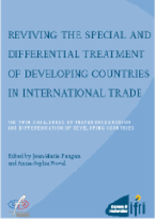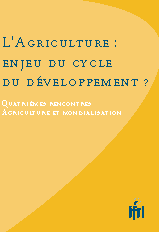Economy
The economy is an essential attribute of power and a major component of international relations. While geopolitical tensions are on the rise, economic interdependence remains strong.
Related Subjects





Justice and World Economy
Ethan B. Kapstein. Over the categorical critics, the majority of praticians or specialists consider the current international policy and its results as fundamentally 'unfair'.




Agriculture: A Stake for Development Round? Fourth Agricultural Meetings and Globalization
The "Old Economy" in the New Globalization Phase
Luis Miotti and Frédérique Sachwald

The Future of Special and Differential Treatment. The Twin Challenges of Preference Erosion and Developing Countries' Differentiation
Jean-Marie Paugam, Serge Perrin and Anne-Sophie Novel
Support independent French research
Ifri, a foundation recognized as being of public utility, relies largely on private donors – companies and individuals – to guarantee its sustainability and intellectual independence. Through their funding, donors help maintain the Institute's position among the world's leading think tanks. By benefiting from an internationally recognized network and expertise, donors refine their understanding of geopolitical risk and its consequences on global politics and the economy. In 2025, Ifri supports more than 80 French and foreign companies and organizations.









